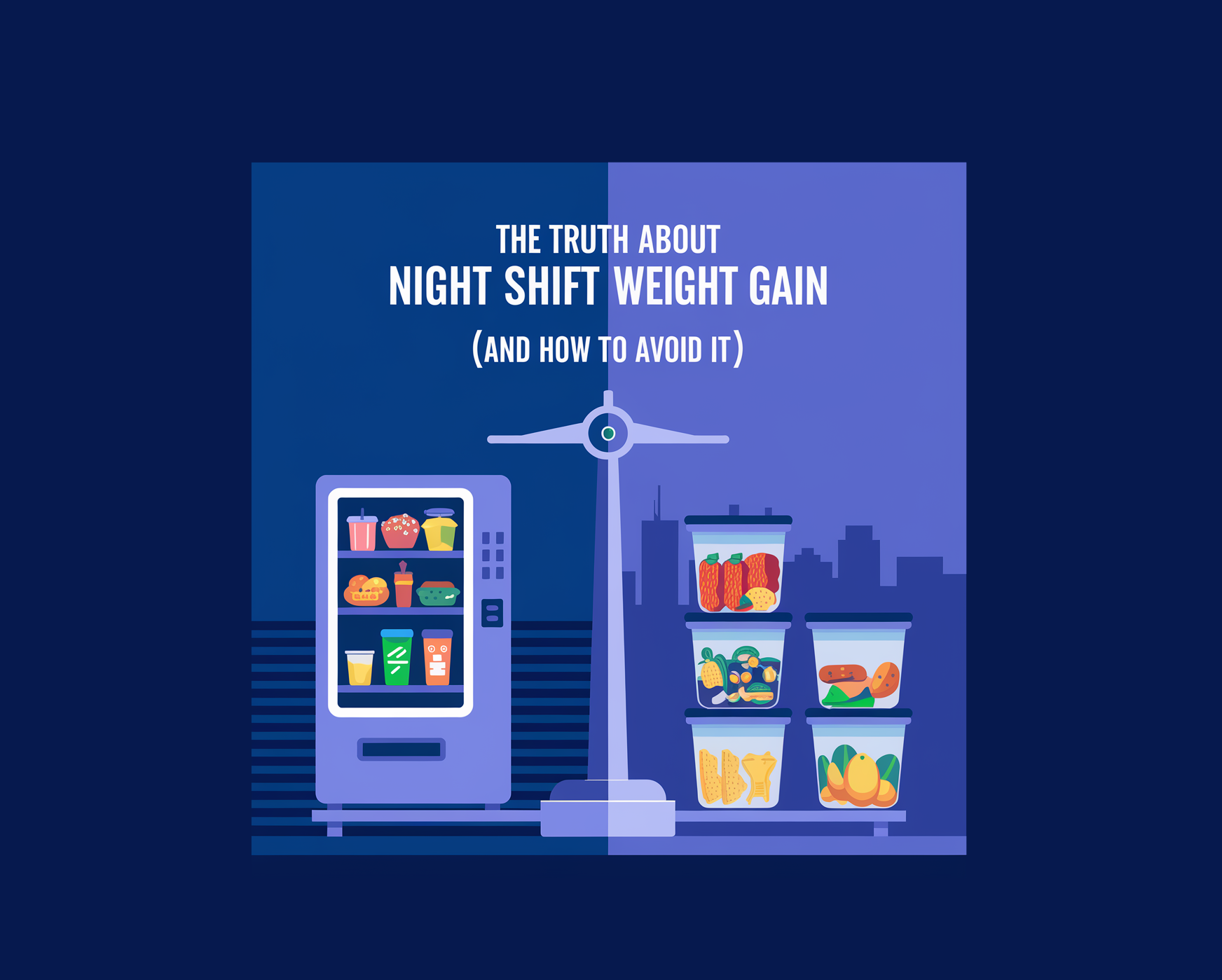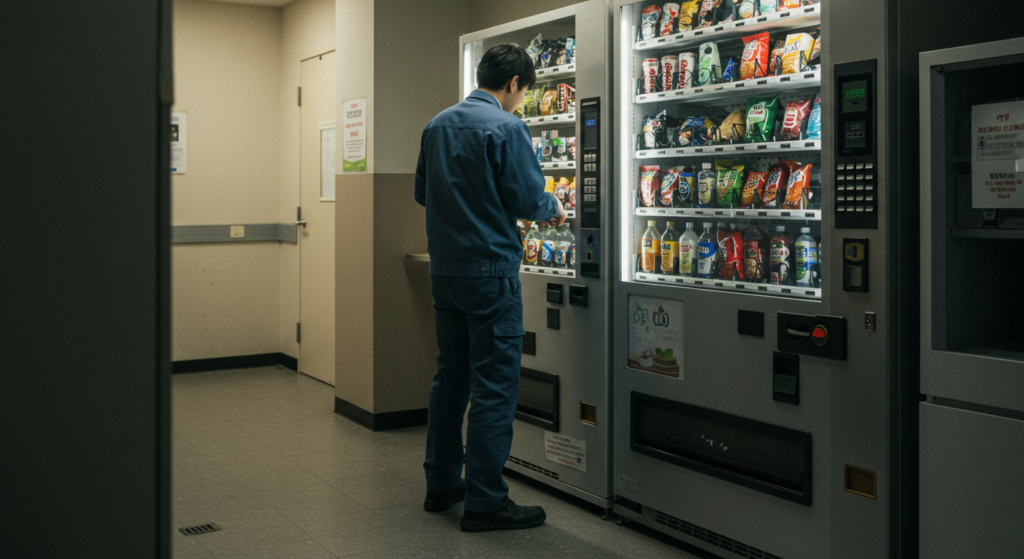The Truth About Night Shift Weight Gain (and How to Avoid It)
In this post, we’ll explore why night shift workers are at higher risk for weight gain, the common pitfalls that contribute to those extra pounds, and how to avoid night shift weight gain with practical, science-backed strategies.

Working the night shift can be tough on your waistline. Many night workers notice the pounds creeping up despite trying to eat right. Is it just in your head? Definitely not. Research shows that night shift workers face unique biological and lifestyle challenges that make weight gain more likely. However, while these challenges are real, the body isn’t entirely rigid in how it responds to a night schedule.
The good news is that with the right adaptation, consistency, and lifestyle choices, you can mitigate these effects and better support your health.
The Biological Impact of Night Shift and Weight Gain (When You’re Not Yet Adjusted)
Your Body Clock vs. the Night Shift:
Most humans are wired to be awake in the day and asleep at night. Night shift work forces you to fight against your body’s natural circadian rhythm (internal clock). This circadian disruption wreaks havoc on metabolism and hormones.
Studies show that working nights or rotating shifts significantly increases the risk of overweight and obesity – one analysis found night shift workers had 23% higher odds of becoming overweight or obese than day workers (ajmc.com). They’re especially prone to developing abdominal fat (“belly fat”), which is the most dangerous kind for heart health.
In fact, night shift workers were 35% more likely to develop abdominal obesity in that analysis (ajmc.com).

Why does this happen?
A big reason is that staying awake at night when most should be sleeping slows down your metabolism. In laboratory studies, when people flipped to a night shift schedule, they actually burned fewer calories over 24 hours than on a normal daytime schedule.
This means that even if you eat the same amount as before, your body is using less energy, creating a surplus that can turn into fat. One researcher noted, “When people are on a shift work schedule, their daily energy expenditure is reduced and unless they reduce their food intake, this by itself could lead to weight gain”(sciencedaily.com). In short, night shifts can slow your calorie-burning engine.
Hormonal Havoc:
Night shifts also throw off the hormones that control hunger and appetite. Normally, at night your body produces leptin, a hormone that signals fullness, and keeps ghrelin (the hunger hormone) low so you’re not hungry during sleep. But if you’re awake all night, this pattern reverses.
Shift workers tend to have lower-than-average leptin and higher-than-average ghrelin levels, meaning you feel hungrier and get weaker “I’m full” signals.
As one sleep expert put it, “Instead of entering deep sleep at 2:00 A.M., you’re three hours into your shift reaching for a candy bar to stay awake. Being awake when you should be asleep confuses your body clock, including the hormones responsible for managing hunger.” (soundsleephealth.com).
Indeed, studies have found night workers produce less leptin (which tells your body to stop eating) and more cortisol (a stress hormone linked to weight gain) (livescience.com).
At the same time, ghrelin spikes and leptin drops if you’re sleep-deprived – a recipe for constant appetite. This hormonal imbalance makes it much easier to overeat. In fact, one estimate found that shift workers consume about 600 extra calories per day compared to day workers (soundsleephealth.com) – likely due to these increased hunger signals and fatigue-driven cravings.
Some newer treatments, like GLP-1 receptor agonists (such as Ozempic and Wegovy), work by regulating these hunger hormones, which is why they’ve become popular for weight management.
Circadian Confusion and Metabolic Shifts:
Our organs have their own clocks too. At night, your digestive system and metabolism expect to wind down.
If you’re eating meals at 3 A.M., your body isn’t as efficient at processing that food.
Late-night eating leads to more fat storage because your metabolism is slower during what should be your “biological night.”
Health reporters note that shift workers are often “eating at times when their metabolism is normally winding down,” which contributes to weight gain (sciencealert.com).
This internal misalignment (being active and eating when your body expects rest) has been linked to higher blood sugar and insulin levels over time, promoting weight gain and even raising diabetes risk.
Essentially, your body processes calories differently at 3 A.M. than at 3 P.M. – with more of those calories likely to be stored as fat during the night.
While all of this may sound like an inevitable consequence of night shift work, it’s important to remember that the body isn’t completely rigid in how it reacts to a nocturnal schedule. Adaptation and long-term consistency help your body recalibrate, allowing many of these metabolic and hormonal disruptions to diminish over time.
When your body and routines adjust—when 3 AM starts to feel more like 3 PM—these effects begin to balance out. More on this later, but for now, understanding some of the background on how these different factors affect those who are not yet adjusted to a night shift schedule is the first step.
Common Pitfalls That Contribute to Night Shift Weight Gain
Night workers often have limited healthy food options during their shift – the cafeteria might be closed, so you hit the vending machine or fast food.
As researchers pointed out, night shift workers may have less access to healthy food choices and often rely on quick, processed snacks.
They’re also exhausted when not at work, which can lead to skipping workouts and irregular sleep (further messing up metabolism).
It’s a vicious cycle: lack of sleep causes more hunger and fatigue, which makes staying active and eating healthy even harder.
No wonder studies have repeatedly found weight gain and metabolic problems to be common in night shift workers. Let’s breakdown some of these common pitfalls that can contribute to Night shift weight gain.
Poor Meal Timing:
- Irregular meal schedules or eating at the wrong internal time can lead to weight gain. If you graze through the night or skip meals then binge later, you’re confusing your metabolism. Calories consumed late at night are more likely to be stored as fat – in fact, eating the same meal late at night causes more weight gain than eating it in the daytime. On average, your body simply isn’t prepared to digest heavy meals at 2 A.M., so those calories stick around.
Need help building a better meal routine? Try our Meal Timing Help tool.
Unhealthy Late-Night Snacks:
- When fatigue hits, it’s easy to grab chips, donuts, or candy from the vending machine. Unfortunately, sugary and salty snacks are a major reason for the weight gain common in shift workers.
- These refined carbs give a quick energy boost but then lead to a crash (and more cravings). Plus, they’re usually high in calories but not filling, so it’s easy to overeat. Consistently munching on cookies, sodas, or fried snacks during the night will inevitably cause weight creep.

Reliance on Caffeine and Sugar:
- Many night shifters guzzle coffee or energy drinks to stay awake, often loaded with sugar or cream. This adds hidden calories and can spike your blood sugar.
- Drinking caffeine to get through the night can also backfire by causing dehydration – paradoxically making you feel more fatigued (too much caffeine can cause you to lose water). And if you’re having caffeine late in your shift, it can mess with your daytime sleep, creating a cycle of exhaustion.
- Using sugary lattes or energy drinks as a crutch both adds calories and disrupts your sleep later on.
Lack of Physical Activity:
- After a long night shift, you’re understandably tired. Many night workers struggle to find time or energy for exercise.
- Over time, this lower activity level means fewer calories burned and loss of muscle mass. Even on days off, you might feel out of sync with the world and skip workouts.
- Research suggests insufficient sleep can also make you less inclined to exercise. All of this contributes to weight gain. Simply put, if your job has you sitting all night and sleeping all day, it’s easy to fall into a sedentary routine.
Struggling to stay active? The Workout Ideas tool gives you quick, no-fuss exercises for night shift life
Inconsistent Sleep Patterns:
- Perhaps the biggest pitfall is poor sleep. Night shift schedules often lead to fragmented, short, or irregular sleep in the daytime.
- As we touched on earlier, chronic sleep deprivation (getting less than 7 hours regularly) creates a hormone imbalance that promotes overeating and weight gain. It raises cortisol and ghrelin (increasing hunger and stress) and lowers leptin (satiety), causing you to feel hungry all the time.
- Skimping on sleep also leaves you tired (of course), and tired people tend to reach for high-calorie junk for a quick energy fix. It’s a double whammy: you’re awake longer to eat more, and your body is hormonally primed to make you eat more.
- Inconsistent sleep schedules (e.g. flipping between night shifts and normal days on off-days) amplify this effect by constantly disrupting your body clock. This is why sleep is absolutely critical for weight management, especially for shift workers.
Understanding these pitfalls is half the battle. Next, let’s look at how you can avoid night shift weight gain with practical strategies that fit your schedule.
How to Avoid Night Shift Weight Gain
Beating night shift weight gain is all about working with your body’s needs (and odd schedule) rather than against them. Here are some science-backed strategies:
1. Strategic Meal Planning for Night Workers
Plan and time your meals to align as much as possible with a normal eating rhythm, even if your “day” is at night. Experts recommend trying to stick to three main meals in a 24-hour period (just like day workers do) (cdc.gov). For example, if you work 11pm–7am, you might eat “dinner” in the evening before your shift, have a lighter “lunch” around 2-3 A.M., and then eat “breakfast” after work in the morning.
Avoid the trap of continuous snacking all night. Having set meal breaks — and bringing your own pre-planned meals — helps prevent grazing on junk.
Also, eat a healthy, filling meal before your shift starts. Don’t go into a night shift hungry, or the vending machine will call your name. A smart pre-shift meal with whole grains or complex carbs, and protein will give you slow-burning energy and curb overnight cravings.
For instance, you might have brown rice or whole-wheat pasta with chicken and veggies in the evening before work. That way, you start your shift satisfied.
Want help planning meals that actually work for night shift? Watch this quick video from our registered dietitian nutritionist for smart, sustainable tips.
2. Choose Foods that Sustain Energy (and Avoid the Bad Stuff)
When you do eat during your night shift, focus on high-quality, nutrient-dense foods that keep you full and energized.
The CDC’s National Institute for Occupational Safety and Health (NIOSH) recommends night shift workers choose foods like vegetables, salads, vegetable soups, fruits, whole-grain sandwiches, yogurt, cheese, eggs, and nuts during the shift.
These foods provide protein, fiber, and complex carbs for steady energy. They won’t spike and crash your blood sugar. For example, you could pack Greek yogurt with berries and nuts for a 2 A.M. snack – it’s high in protein and healthy fat, which will keep you satisfied better than cookies or chips.
Don’t Let Sugar Sneak In—It’s Sabotaging Your Night Shift Energy
Equally important is what to avoid at night: skip the sugar and refined carbs as much as you can. Sweet cereals, candy bars, white bread, pastries, and sugary drinks can cause a quick blood sugar spike followed by a slump in energy – and they’re easy to over-consume.
NIOSH specifically advises limiting “sugar-rich products and low-fiber carbs” on night shift, since they can actually increase sleepiness (the opposite of what you want!) and contribute to weight gain.
In other words, reaching for a donut when you feel drowsy might wake you up briefly, but it’ll likely make you more tired soon after and add unnecessary calories.
Instead, keep healthy snacks within reach: think nuts, carrot sticks or cucumber slices, apple slices with peanut butter, hummus with whole-grain crackers, or air-popped popcorn. These will satisfy crunch or sweet cravings in a healthier way.

A smart strategy is to bring your own food to work.
Packing your lunch and snacks means you’re less at the mercy of whatever’s available at 3 A.M. (which is usually a vending machine or fast food). As one nutrition expert noted, “Take your own food so that you don’t fall into the delivery or vending machine trap. Convenience foods [from vending machines] typically contain extra calories, sugar, and saturated fat… and do not keep you full for long. Sugary and salty foods are a major reason for weight gain in shift workers.” (uncnri.org) Planning ahead ensures you have balanced options on hand and helps you resist impulsive junk food choices.
Tired of vending machine regrets? Our Meal Planning tool helps you bring satisfying, healthy meals
3. Manage Late-Night Cravings and Emotional Eating
It’s 4 A.M., you’re bored or stressed at work, and you really want that candy bar. We’ve all been there. Night shifts can lead to “mindless” eating out of stress, boredom, or to stay awake. To combat this, try a few tactics:
Stay Hydrated:
- Sometimes thirst disguises itself as hunger, make sure you’re drinking water throughout your shift. Keep a big water bottle at your station and sip often. Hydration can also fight fatigue.
- In fact, dehydration (often due to too much caffeine and not enough water) is a common cause of feeling tired on night shift. So before you reach for a sugary snack, drink a glass of water or herbal tea and see if that helps your craving pass.

Identify Hunger vs. Tiredness:
- When a craving strikes, ask yourself “Am I truly hungry, or just sleepy/stressed?” If you’re yawning and sluggish, caffeine or a short walk might help more than food.
- If you’re stressed or bored, a quick chat with a coworker or a few minutes of stretching could reset you. Use food to satisfy real hunger, not as the automatic solution to every slump in alertness.
Have Healthy Snacks Ready:
- As discussed, bring snacks that you can enjoy guilt-free. If you crave sugar, fruit can help (natural sweetness + fiber). If you need crunch, try nuts or roasted chickpeas.
- Love something sweet after midnight? Try keeping a protein bar or a piece of dark chocolate on hand instead of a donut. This way, when emotional or habitual cravings hit, you have a smarter choice available.
Practice Mindful Eating:
- It’s easy to munch through a bag of chips while distracted on the job. Try to take a proper break for eating whenever possible.
- Even if it’s 15 minutes, step away from your work area, eat slowly, and savor your food. This helps you notice when you’re full. Eating in a pleasant, relaxed environment (maybe with a colleague for company) can prevent overeating out of stress.
Finally, don’t be too hard on yourself. Night work is stressful, and everyone indulges sometimes. The key is making these indulgences occasional rather than nightly habits. If you find you’re using food regularly to cope with the difficulty of night shifts, consider other stress management tools (short walks, stretches, listening to music on break, etc.) or talk with someone about the challenges you’re facing. Emotional well-being is linked to eating habits, so taking care of your mental health on night shift will help your physical health too.
4. Fit in Physical Activity on a Night Schedule
When you’re working nights, traditional 7 A.M. gym classes or evening jogs might not fit. But being active is still crucial for maintaining a healthy weight and counteracting the metabolic slow-down of night work. The trick is to get creative with scheduling and types of exercise:
Exercise Before or After Your Shift:
- Some night shifters prefer to work out before their shift in the late afternoon or evening (if you wake up in the afternoon, treat exercise as a way to kickstart your “day”). Others like to do some light exercise after work in the morning to unwind before going to sleep. Find which works best for your energy levels. Even a 20-30 minute workout can make a difference.
- For example, you might do a quick home workout or hit the gym at 8 P.M. before heading to work, or go for a morning walk at 8 A.M. after your shift – whatever feels good. Try to avoid overly intense exercise right before bed, as it can make it harder to fall asleep.
For real-life advice on staying active while working nights, watch this quick video from a police commander and wellness coordinator on maintaining fitness during a night shift schedule.

Short Activity Bursts:
- If a full workout is hard to schedule, break it up. Even 10-15 minutes of moderate exercise during your shift can boost your metabolism and help your health.
- Could you take a brisk walk around the building on your break, or do some stretching and jumping jacks in a quiet area? Some workers walk flights of stairs or do bodyweight exercises (like push-ups, squats, or using resistance bands) during downtime.
- These mini-sessions add up and also help you stay alert on the job.
Use Days Off Wisely:
- On your off-days, try not to slip into total couch-potato mode (even though you’ll be tempted!). Schedule some fun physical activities – maybe a bike ride, a fitness class, or a workout with a friend – when you’re feeling more rested.
- Consistency is key; aim to get at least 150 minutes of moderate exercise per week (the standard health guideline) by spreading activity throughout the week.
Make It Enjoyable:
- When you’re already tired from night work, forcing yourself to do an exercise you hate is extra hard. Pick activities you actually enjoy to increase your chances of doing them.
- Like dancing? Put on music and dance for 15 minutes when you wake up. Prefer yoga? Do a relaxing yoga video in the morning sun to center yourself before sleeping. If you enjoy team sports or group workouts, see if any are available at times you can attend (some gyms have late-night classes, or you might find a 24-hour gym).
- In addition, consider purchasing and using a wearable device to track your movement, heart rate, and activity levels. Many fitness trackers and smartwatches can help you set daily movement goals, remind you to stand and stretch during long shifts, and even monitor your sleep quality.
Remember, exercise not only burns calories but also improves your mood and sleep quality. It can help reset your circadian rhythm too. So being active will give you more energy in the long run – it’s worth squeezing in, even if it’s just a little bit at a time.
5. Prioritize Sleep and Optimize Your Rest
Quality sleep is the secret weapon for weight management, especially on a night shift schedule. As we have touched on numerous times already in the post, when you don’t sleep enough or your sleep is irregular, it directly affects the hormones that control hunger and can lead to overeating. Here’s how to improve your sleep as a night shifter:
Stick to a Consistent Schedule:
- If possible, keep a similar sleep routine even on non-work days. Going back and forth between night schedule and day schedule confuses your body. Try to go to bed and wake up at the same times every day – even on off-days, maybe shift your sleep only slightly earlier to have some daytime with family, but not a full flip. Consistency helps train your body when to release sleep hormones and when to be alert.
Create a Dark, Quiet “Day Sleep” Environment:
- Daytime sleep can be tough because of sunlight and noise. Make your bedroom feel like midnight. Use blackout curtains or an eye mask to make the room pitch dark. Use earplugs or a white noise machine/fan to block out lawnmowers, traffic, or daytime chatter.
- Keep the room cool and comfortable. Think of your bedroom as a cave: cool, dark, and quiet. This signals your body that it’s sleep time even if it’s noon.

Limit Caffeine and Screen Light Before Bed:
- As a night worker, you might get off work when the sun is up. Resist the urge to run errands or scroll your phone for hours, as this can wake you up too much.
- Avoid caffeine in the last 4-6 hours of your shift (switch to decaf or herbal tea toward the end). The caffeine can linger in your system and make it hard to fall asleep once you’re home.
- Also, try to limit screen time (phone, computer, TV) right before bed – the blue light from screens tricks your brain into thinking it’s daytime.
- Some night workers wear dark sunglasses on the drive home to reduce sun exposure and help keep melatonin levels up before sleep.
Caffeine keeping you up? Use the Caffeine Optimizer tool to find your ideal cutoff time
Use Naps Strategically:
- If you can’t get a single long sleep, consider splitting it. For example, some people take a short nap before their shift (even 20-30 minutes in the late evening) and then sleep 5-6 hours after the shift.
- A brief nap before work can reduce sleepiness and might curb those late-night cravings that come from exhaustion. Just be careful not to nap too long or too close to your main sleep, which could interfere with your ability to sleep later.
Educate Family/Roommates:
- Let the people you live with know that your “night” is during the day. Put a sign on the door or communicate your sleep hours so you’re not disturbed.
- Treat your sleep time as sacred – because it is! The more consistently you can get 7-9 hours of sleep in 24 hours (whether in one block or split), the better your body can regulate appetite and weight.
Optimizing your sleep will not only help prevent weight gain (by normalizing those hunger hormones) but also improve your energy and focus, making all the other healthy habits (meal prep, exercise) easier to maintain. Remember, sleep is just as important as diet and exercise when it comes to weight control.
Wrapping Up: Night Shift Weight Control IS Possible
Night shift weight gain is a real challenge, but it’s not inevitable. The truth is, your body may react differently on a night schedule, as your circadian rhythm, metabolism, and hormones no longer follow the same patterns they were accustomed to on a traditional schedule.
Before your body fully adjusts, these biological factors, combined with environmental challenges (like fewer healthy food options and odd hours), can make weight gain more likely. However, with the right adjustments and proper adaptation, these effects can be fully mitigated.
Weight Gain Isn’t Inevitable—Night Shift Wellness Starts with Small Wins:
To recap, night shift workers can reduce their risk of weight gain by: planning meals and timing them wisely, choosing nutritious foods and limiting sugary snacks, managing cravings with smart strategies (stay hydrated! bring healthy snacks!), finding creative ways to stay active, and making sleep a top priority.
These steps work together—getting enough sleep strengthens your ability to make healthy choices, while balanced meals provide energy to stay active and reduce junk food cravings. Small changes, like cutting out a 2 A.M. junk-food run or adding a 15-minute walk on breaks, can add up over time to help your body adjust and maintain a healthy weight.
For those using or considering GLP-1 medications for weight management, these strategies—such as meal timing, protein intake, and sleep optimization—can complement the effects of these treatments by helping regulate hunger and metabolism more effectively on a night shift schedule.
Most importantly, be kind to yourself. Before your body fully calibrates to a night shift lifestyle, the adjustment period can feel frustrating. Don’t expect perfection; aim for consistency and awareness. Over time, your body can adapt, and these strategies will feel more natural. By making small, intentional changes, you’ll not only avoid the night-shift weight creep but also feel more energetic and healthier overall. Stay safe, stay healthy, and happy nightowling!
Sources:
- Van Dongen, H. et al. NIH Research Matters – How night shifts disrupt metabolism nih.govnih.gov.
- University of Bristol News – Circadian misalignment increases appetite in shift workers bristol.ac.ukbristol.ac.uk.
- Sun, M. et al. (2017). Obesity Reviews – Meta-analysis on shift work and obesity (summary via AJMC) ajmc.comajmc.com.
- Wright, K. et al. (2014). Proceedings of the NAS – Energy expenditure is reduced on night shift (via ScienceDaily) sciencedaily.comsciencedaily.com.
- Live Science – Study on Australian nurses: switching to night shift led to higher BMI livescience.com.
- Molumphy, N. (2024). Stanford Lifestyle Medicine Blog – Sleep deprivation, ghrelin & leptin longevity.stanford.edu.
- Sleep Foundation – Sleep loss causes hunger hormone changes and cravings sleepfoundation.orgsleepfoundation.org.
- CDC NIOSH – Diet guidelines for night shift workers (avoid midnight meals, choose healthy foods) cdc.govcdc.gov.
- UNC Nutrition Research Institute (BMJ) – “What to eat on night shift” article uncnri.orguncnri.org.
- Sound Sleep Health – Why shift work leads to weight gain (hormonal effects) soundsleephealth.comsoundsleephealth.com.
- ScienceAlert – Night shift “body clock misalignment” and health risks sciencealert.com.
- Journee (Night shift fitness blog) – Tips from experts on exercise and sleep for night workers journee-mondiale.comjournee-mondiale.com


![Photo of [object Object] in undefined](https://nightowling.com/wp-content/uploads/2025/11/image-28.png)